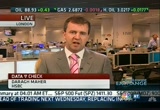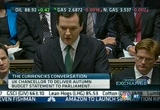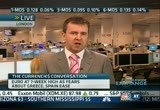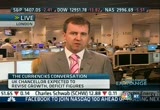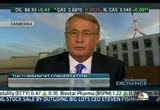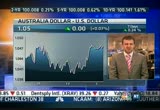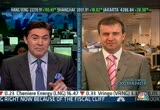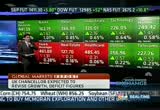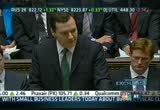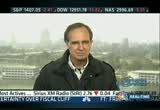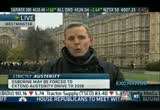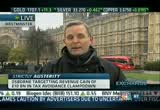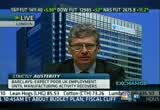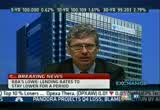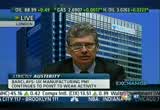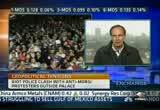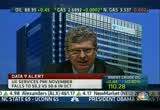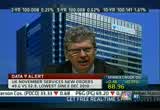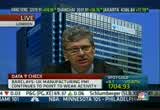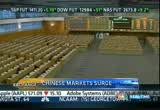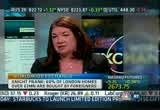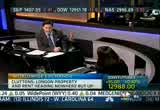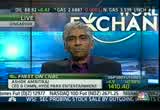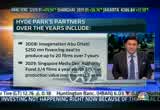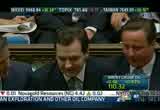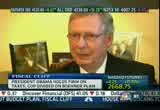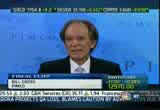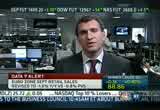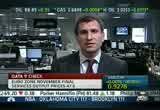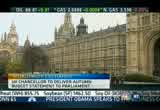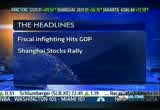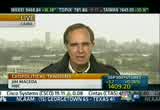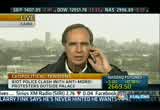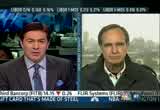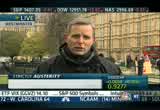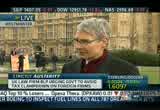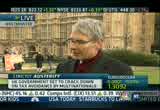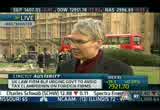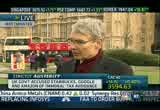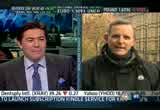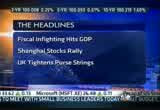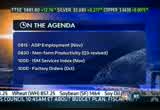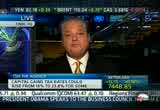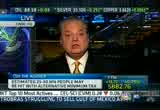tv Worldwide Exchange CNBC December 5, 2012 4:00am-6:00am EST
4:00 am
this is today's "worldwide exchange." i'm ross westgate. here are the headlines from around the globe. another shanghai surprise. beijing's leadership calls for economic stability and some business growth. more austerity for britain that faces further spending cuts. chancellor george osborne getting ready to face his autumn statement.
4:01 am
it's had a number of approaches enter sbred -- interested in buying the venture. >> you're watching "worldwide exchange." >> the final serves as pmi better than the familiar number. the 45.7 was a tick-up from october. the final composite pmi is also higher. 46.5 to 45.8 flash as well, the highest since july. so the economic slump a little less pronounced in november than previously thought, although the session still looks very much on course for another quarter here for europe. the pmi will rise above 50 that
4:02 am
divides growth between contraction. hasn't stopped the euro/dollar from hitting a one and a half month high. i suppose we know growth is going to be anemic, but if spanish banks are getting some money, are we feeling slightly better? >> that's what euro trades on, isn't it? pmis are all very interesting for the economist. but they want bigger stories. most of the news flow, it's helpful to the euro. people have been trying to affect this rally for a while. we are close to those october highs. the news flow has been good, i would say. >> we hit, what, nearly 131.80? >> before that, we go 131.40. the enthusiasm for euro is
4:03 am
surprisingly good. we're surprised by how far this rally has gone on pretty thin news sometimes. >> i just want to recap what we've got. eurozone finance ministers meeting in brussels. an agreement still seems pretty elusive at this moment. germany and french finance ministers have very different views about oversight of banks. and in britain, the chancellor george osbourne delivers his statement to parliament today. will be out in westminster soon. steve is out to give us more detailed analysis of what to expect. let's just go back to the eurozone. as you say, thin advances here. are we capping -- it's up against the yen as well. there's obviously been a big yen story. >> yeah, i think the euro/yen has had perhaps more to do with
4:04 am
eu euro/dollar than anything else. the euro crosses in general have been story rather than euro/dollar and euro/yen at the forefront. i think the euro/yen forecast is overplayed in what japan will ultimately deliver on. but mum is pretty good. i think you still play for a little yen weakness. i think we'll see a lot of people trying to buy yen back because i don't think we'll get delivery in all these preelection promises. >> do we all think we know what the chancellor is going to say? >> judging by the many pages being given to it in the newspapers, you feel like what else can he say? it's not going to be a day where you'll buy sterling aggressively because most of the news is going to be bad. we're going to have lower growth. potentially missing at least the underlying fiscal targets and
4:05 am
rules. so it's not a great day for sterling. i think the bigger impact will be if the rating agencies get twitchy. then i think sterling will be a bit more vulnerable. but i don't think it's necessarily a story for this afternoon. >> we saw manufacturing came in slightly better than expect. so there risk to the upside from the pmi? >> maybe. it doesn't feel like pmis are really getting a grip on the market. we're not in a world where interest rates are going anywhere, so it's hard for these kind of economics to drive the currency. what we are wondering is bigger picture, like the downgrade risk. what is that, is that going to be amplified today, are diminished. >> we have a recap of the gdp data today. >> the headline numbers show gdp grew at the slowest pace a year and a half in the third quarter, rising half a percent for the year. gdp grew 3.1%.
4:06 am
while this is slower than previous quarters when you compare it to some of the other developed economies, you can see how well australia is holding up. we've seen growth of just 2.5% in the u.s., 1.5% in canada and zero growth in the uk. locally, cutbacks in government spending weighed on the numbers and lower commodity prices also impacted on cash flow and the government is facing more criticism about its effort to keep the budget in surplus while the economy grows. >> the government has had the objective of making sure that we would bring our budget back to surplus when growth has been around trend. what we've been seeking to do through good budget policy has been to provide maximum flexibility to the reserve bank to a just rate so. the government will always put in place appropriate budget settings which will support growth and jobs. >> still, analysts say growth could slow further as the mining
4:07 am
investment boom peaks. yesterday, the bank of australia cut interest rates to a record low of 3% and traders are looking further easing next year to offset the falling talks of trade, the high australian daughter and further cutbacks in government spending. >> despite that prognosis for rates and the fact that we're now matching the record lows here, the aussie/dollar actually rose. is the aussie/dollar going to attract more than do mes snimes? >> it just keeps bouncing back. the idea that australia is in a better position to capitalize on that than some others. it's not been particularly helpful. you've got a very unbalanced economy. we think the rate cutting cycle may well be over, but the market isn't particularly viewing it
4:08 am
that way as of yet. so the aussie still has that headwind. but it feels like headwinds. it is a bit frustrating because we are quite bearish in aussie but we're not getting that kind of downside momentum. it's just stop the cap side. >> you never know. >> it's a rarity. >> it is a rare thing for you. hang around long enough, it will go your way. thanks for that. >> cheers. spain. the treasury is setting up three, seven, and ten-year bonds. they're now pre-funding for 2013. we've got the results of that in around about 30 minutes. and china and india secretary growth slowed in november.
4:09 am
analysts say china and india's nonmanufacturing team expected to improve thanks to a hiring boost in the mainland as well as strong new orders in india. at the same time, china's new leadership, as we pointed out, has laid out some fresh directives. >> these are some pretty sweeping reforms making china's famously inefficient bureaucracy more efficient. it's an effort to "win the confidence and the support of the people" as public backlash rose against the special treatment of politicians. so a new list of dos and don't's for chinese leaders. on the do side, cut down on giving face. the art of extreme flattery or reverence, which results in some very long meetings and speeches. keep them short and cut down on the lavish feasts. he's also encouraging more travel to rural parts of the
4:10 am
country where the real problems are. on the don't's side, stop the empty talk. in china, niceties are often more formal and exaggerated than west. another one is don't stop traffic. if you've ever been to beijing, chances are you've sat in traffic because a government motorcade was driving through. this happens all the time in chinese cities and it's not just for the very top officials. this last one, newspapers in china often have the faces of leaders on the front, no matter how mundane the story. the latest reforms want more real content. all of these reforms, they have a common objective. she wants the government to regain the public's trust. back to you. >> the new leadership also set some key economic priorities, which had a big impact throughout asia today. sixuan has the details. hi, sixuan. >> hi, thanks, ross. some call it a shanghai surprise. mainland markets staged a strong rebound. this called for economic
4:11 am
stability by boosting domestic demand, keeping property curbs. the shanghai composite jumped nearly 3%. the ipo pipeline may be on hold. financials, commodities and infrastructure are among the top gainers today as investors take advantage of cheap valuations. the hang seng followed suit and declined to a 16-month high. insurance surged 5% after hsbc explored a stake group. the nikkei closed at a seven-month high. shares gained 4% after the qualcomm investment firm. in south korea, samsung hit another all-time high, helping the kospi finish higher by .6 of a percent. this despite a slightly slower
4:12 am
gdp growth in q3. back to you. >> sixuan, thanks very much indeed for that. that's feeding into european markets. flat as a pancake. this is where we stand. ftse 100 up half a percent. cac up 7%. break that down into sectors, you will see basic resources, best gainer. that son the back of the chinese data. banks not doing too badly as well, so europe helping out a little bit on that side as well. three sectors. household goods. certainly having the market impact at the moment. plenty of other data to go. on the debt markets, we'll keep our eyes on spanish auctions.
4:13 am
probably nothing too much to worry about there. this is the service sector and the autumn statement will get a big focus for guilts today. 1.83% on the yields. on the currency markets, we talked about euro/dollar being high. look at aussie/dollar. euro/dollar here at 131. let's show you where we are with oil. not the same lift as we saw from a basic resource, but nevertheless, slightly firmer. nymex just under $89 a barrel. spot gold a little bit firmer at the moment along with silver as well. generally getting that china boost. still to come, egyptian president morsi has returned to work just a short time ago after leaving the palace during protests last night. we'll be in cairo with the latest after this.
4:16 am
4:17 am
industry. cet will head out to washington as president obama is pushing forward his tax for the wealthy agenda. george osbourne is going to update today. the chancellor will have his work cut out to meet his target of eradicating the federal deficit by 2015 as well as securing a fall to gdp ratio. also expected further pressure with a cut to its growth forecast. steve is braving rather inclement british winter weather outside the houses of parliament. >> lovely. >> i know you like it. how much is it going to be raining on george osbourne's parade? >> it's going to rain on his parade. you just nailed it, ross. three things which are going to come up today, which he has very
4:18 am
little control over. one is that obr reckoning on the uk economy. thought only back in march it was going to grow -- pain a negative growth for the year. next year they thought it was going to be 2% growth. it's probably only going to be 1%. in terms of those two targets you mentioned, eradicating the structural deficit in a five-year period, that's going to have another couple of years. >> right. now, there we go. you can see jim there in egypt. i wonder whether we should just go as we've decided to cut to him or maybe we can bring steve back. right. we'll try and reestablish steve. we will be going to jim to talk about egypt. we've also got judy standing by. steve, you were brutally cut off in your prime. so let's talk about -- let's get
4:19 am
back to the point where you were at, which is talking about the structural deficit. >> yeah, i think that's where you cut me off in my prime. but anyway, the deficit is clearly not going to achieve getting rid of that in a five-year period. many estimates believe that in 2013-2014, the next fiscal year, it's going to be around 7%. that's better than the 11% inherited by this government, but will be a couple points worse than greece and spain. so that's a big negative for george osbourne. another one will be getting the percentage of debt compared with gdp in the country, getting that down within a five-year period, getting it syncing in the right direction. he thought it was going to peek around 75%, 75%. it looks like it could go up even further. so let's see what he says on that front today. in terms of options, he has very few options indeed because this is a government which as we know
4:20 am
has set its fallout on plan a. and yet, are we seeing real austerity? i'm not entirely sure. government borrowing this fiscal year so far in the five months that we have figures for already is 26.7% higher than the same period a year ago. the idea originally this year was for flat spending and then getting it down there after. and he's having to borrow more and more money, october figures were around 2.6 billion pounds more in borrowing than analysts expected. having to borrow more because tax receipts and corporations are falling. the labor party -- i was speaking to rachel reeves earlier on, just because they've got their plans wrong. they've cut in the wrong areas, they're not thinking about the infrastructure growth that this country needs to get itself out of the mess. so let's see what it comes up with today. it's just a question of whether he can take it away from some departments and give it to others. of course, there's this whole
4:21 am
rich versus poor debate also. the poor we're talking about are only so rich. for instance, taking it away. the free amount of money you can put into your pension before you get taxed on it. at the moment, that's 50,000 pounds. estimates are that it will go down to 30, 40,000 pounds. even if they put it down to 30,000 pounds, it's only going to raise around 8.1 billion pounds extra. when you consider total government spending and borrowing, that's a drop in the ocean. welfare is about 186 billion pounds. you can see the kind of numbers we're talking about. tinkering at the edges as well. there will be more money into education, into science, into infrastructure as well and he'll be talking about the infrastructure initiatives including more must be for small to medium size businesses, more money for power stations as well. but it really looks like he's
4:22 am
got very little room for maneuver. the opposition, he'll get that and say this is your fault, these are your policies. mr. osbourne will turn around and say look what's turning around you. look what's going on in the financial sector. look what's going on in the eurozone as well where unemployment is actually on the surface much worse than it is in the united kingdom. so it's going to be the usual ding dong battle of theatre. but i doubt we'll see many new initiatives that haven't been leaked already, ross. >> yeah, you only have to read the papers today and everything seems to be in there. i think you've done a very good two and a half-minute analysis of everything we might get. well-done. we'll come back to you later. get a cup of coffee, stay warm. julian joins us with his own thoughts. steve got into all the details. he's laid it all out for us. what is actually the main takeaway here for international investors into the uk from this
4:23 am
budget statement? >> i think international investors are going to be very focused really on how the debt profile is looking because that is very important for the rating agencies, and of course there will be that level of concern that next year the uk might lose its aaa rating status. i think the government and the chancellor are probably going to be very sensitive to that level of concern and really want to do all they can to keep it. that means really reiterating still that they are going to meet with debt rule and that means that the net debt gdp ratio would be on a declining path from the fiscal year 2015 to 2016. the other issue is really the uk growth has been disappointing. the uk has had a really tremendous growth side coming from weakness in eurozone demand. during the course of the last few quarters, which has really
4:24 am
impacted very negatively on the government's hopes that the corporate sector might be in some position to help lead the recovery here. and so therefore probably you may need it to be done to support and hopefully boost domestic demand in the uk, but doing that while still preserving the fiscal arithmetic and while some indications would suggest the deficit has been moving a bit off track, it's beginning to be very challenging really. but some of the media reports are pointing to a greater focus to capital investment on infrastructure spending. so i think that's something that international investors need to focus on. >> yeah. we'll get pmi out as well in a minute, julian. adam poser said he thought they were being too pessimistic about
4:25 am
growth in the uk. 1%, 1.5% is probably what we'll get. >> you know what, i think the environment, as you look out to next year, is really difficult, ross. i mean, you don't really know what is going to come out of the u.s. fiscal cliff, how damaging potentially that can be to u.s. confidence, u.s. activity. things seem to be holding up fairly well in china. but i think there is still going to be some concerns about the whole performance of the asian economy and whether that can actually pick up next year. and then, of course, in the eurozone itself, we seem to be mending the problems progressively and taking out the tail risks, which i think is good and that is the bottom line that investors should take going further forward, but at the same time, there are some elements that you can have. if you do a forecast, in a way you could come up with something like 1% quotes for next year, but at the same time, you have to be conscious that we've had
4:26 am
such a battery of downside impact, downside negative news coming through really for all economists in the western world in the last few years. you have to be very cognizant of those. >> i think so. julian, we're going to leave because we have to get a break in and we've got to g to egypt as well. thousands of egyptians still camped outside the presidential palace in cairo. the police left during the protest, which allowed the demonstrators to get close to the palace walls. morsi allegedly left during a back wall, but returned to work just a short time ago. joining us now from cairo is nbc's news correspondent jim meceda. good to see you what. is the situation like at the moment? >> thank you for that short cameo appearance a little while ago. the opposition made a statement last night, no question about it, when those tens of thousands anti-government protesters
4:27 am
marched. it's a symbolic seat of power, the presidential palace. morsi as we know is conducting business inside. all that was caught on live tv. they were met by rows of barbed wire, barricades and riot police. they were not chanting just to lift morsi's decrees or to cancel the referendum on the draft constitution. what we heard last night were chants like "no more morsi," "down with the regime." overall it was peaceful. at times it was even festive, except at one point when police fired tear gas into the crowd to try to push them back. some protesters broke through the lines. but then we saw the motorcade leaving through the back exit and in a bizarre twist, police actually put down their riot gear and slowly retreated themselves from the area, leaving it to some very baffled protesters as to what to do next. they approached the palace walls and demonstrated all night. we do know now that they've been demonstrating as well in smaller numbers all day today and that
4:28 am
morsi, as you said before, has returned to work earlier this morning, as if nothing happened. ross? >> all right, jim. we'll see what happens this morning. we'll come back to you during the show. we can't get too many appearances from you, jim. thank you very much. nbc's jim maceda. we arelating for the latest numbers out of the uk. we did see the numbers coming a bit earlier. so in about two second we'll get the uk numbers. this is it. they're out. uk services pmi down to 50.2. it was 50.6 in october. the reuters poll 51.1, the lowest since december 2010. the contraction territory, 49.6. october 52.9. that's the lowest since december 2010 as well. it means the composite pmi is upside, because we did see slightly stronger than expected manufacturing numbers.
4:29 am
the dominant sector growing last month at its slowest pace in nearly two years. let's get reaction to that from julian who is still with us. >> i think the view of my uk colleagues has been that we are going to see some slight contraction to uk gdp in the fourth quarter after the very strong number that you had in q3. so that kind of pmi news i think would be consistent with that view. i think it goes to show that confidence is still quite fragile, and we do need to see some generalized improvement in global confidence to emerge over the course of the first few months in 2013, in order that we can be feeling more optimistic. >> it's the first time new order is down in contraction territory. first time since we've had big snowfall two years ago. we've got a bit of snow today in certain parts of the country in britain. we had this big olympics boost.
4:30 am
is there a natural falloff from that? >> i'm not so sure myself that that would really be coming through in this particular services pmi number. as you say, i think the new order's weakness is really quite material to this, and i think the services pmi is treated by many economists as being a good indicator to what is happening in the uk service sector given the lack of other high frequency data there. so i think it needs some more attention, of course. it would be useful to see some of the other components as well. but from an international perspective, i would say that it would fit in with the general view that having seen the numbers across europe for q3, if anything be a bit better than had been expected. for example, industrial production was flat quarter on quarter roughly speaking in the likes of italy and france and actually grew for germany.
4:31 am
then in q4, it seems that there is a greater degree of destocking i think, materializing. i think that is going to lead to some weakness on the industrial production side and it does appear that the austerity is very much perceived by household and by service sector companies. and that explains this relatively soft data. it's a sign that really we are still in a period of multi-year major fiscal entrenchment and at the same time, we have a very cautious perspective towards taking on debt. both by the suppliers and the demanders of that debt. >> julian, very briefly, will we see more qe? will we see any more next year or not? >> well, it will depend, i think, on how things develop. on our baseline forecast, the answer to that would be no because we are looking for recovery coming through really reasonably significantly from the first quarter of next year
4:32 am
with .4% quarter on quarter. >> julian, thanks for that. always good to see you. julian kelly joining us from barclays. which country is more corrupt and which is least? you can go to our website today to get the interesting numbers. denmark, finland and new zealand tied for being the perception of the cleanest countries. but who ranked highest as the percentage of the most corrupt country? get it all on cnbc.com. foreigners are still flocking to the london property market. find out why more chinese and russian investors are sinking more money into the capital. we'll get into that.
4:35 am
4:36 am
european stocks flat as a pancake. we are firmer today, boosted by chinese leadership comments. pmis were okay for europe, not quite as bad. fairly disappointing. the component slipping into contraction territory. bond markets got spain auctioning prefunding of 2013 coming out. should be very confident. a little bit higher than they have been. guilt yields are higher as well. on the currency market, euro/dollar has been up to one and a half-month high. at the moment, just below that. elsewhere, the dollar is down against the pound. up against the swiss franc and up against the yen. been talking about the chancellor george osborne today. the british finance minister expected to ramp up fiscal titan
4:37 am
numbers. he specifically might take another pop at the property market. many experts say it's hurt the residential market in greater london. today he might stick another percent on that stamp. he might raise it over 1%. joining us is sue foxley. good to see you. thanks so much for joining us. mark field says -- he's quoted today, he says figures show we've had a 53% decrease in greater london property sales between 2 and 5 million. is it all stamp duty? how much of an impact do you think it's had? >> i think stamp duty was really the nail in the coffin for that part of the market during this period. i mean certainly there is a struggle there in terms of the economy and there is uncertainty in order to make a big investment like that. people are a little bit nervous. i think the caution now is not so much the actual figure, which obviously don't's things particularly just over two
4:38 am
million, but it's more the concern that actually we don't know quite what's going to come next. and we really need a stable transparent system that we can trust as how we're going to move in the future. >> the chancellor sticks another percentage on to stamp duty. if he raises it up one million, all going to have a big collective groan. >> i think we all should have a collective groan actually, because at that level, it really starts to impact in terms of what people need to say. if someone needs a mortgage -- two million sounds like a lot of money, but in london, actually, that really isn't a huge amount of money. that buys a nice family house for professionals that we're trying to attract to the city and maintain our competitiveness. million just about buys a flat in many areas. so to bring up a family and all of those things for normal professionals in london, that actually is a real hit. that's a huge chunk on an additional deposit that someone needs to save. >> yeah. so look, what's happening,
4:39 am
prices are stable but transactions pretty nonexistent. >> actually, prices are risen. over the last year, we've seen a 6% rise in prices. we've seen that slow down with the transaction levels. prices have been maintained because there is very little to buy. so actually, people who just want to -- their families are growing, etc. coming into the country to work, have very few options. but it certainly has slowed over the last quarter. >> who are buying? because we've seen reports about, you know, wealthy migrants and specialists visas, coming to russia and the chinese who. are the people that are happy to buy? >> it makes a very, very small -- buying in the streets in central london. >> you might be right. >> so that's not the market. certainly not the figures that land registry are talking about there in terms of a slowdown. the slowdown is it's sort of normal people working here,
4:40 am
including overseas. we rely on a large overseas highly skilled professional contingent who are here, or educated here. and they're the people who are either -- buying and trying to get their first homes, or sort of moving up. it's very little to buy. >> how different is the short-term prognosis for the long-term? you sponsored this report. michael ball in business school, who said that in the end, property prices in particular were meant to go nowhere but up. why is he arguing that? >> the issue is that london is a growing city and we want it to grow and the economy to grow. the fact that we're not building, the green belt is constraining us, so we've got an issue there. but it's also very, very difficult to build into the center. there are more people coming. but also the aspirations are that much higher. as we earn more -- as the capital becomes more economically strong, people want more for their money and that places greater and greater pressure. it's not just investors coming
4:41 am
here. that's a small part of it. it's the business and the economy back to the sort of basic economic theory. >> when a property agent comes out, sponsors a report that says prices and rents are going nowhere but in one direction. >> you think. but then it's something that we could see in the market that was happening. and therefore i want to understand why. i want to understand where the opportunities are. if the pressures are in zone one, maybe where are new graduates going to come from? are they going to go to zone two, zone three? there are obviously opportunities there for my clients. >> there's a llt of wealth west of london really. so what's happening sort of east and north? >> east is interesting. east -- regeneration schemes take a long time to come through, but they do come through. there is tremendous infrastructure coming in there, which will have an impact. we've also got the situation that a lot of overseas buyers -- particularly asian buyers feel very comfortable there. it suits their needs and values. so there is a lot of activity.
4:42 am
but it's a longer term. >> thanks very much for coming in. property agents in london, have any thoughts or comments? please e-mail us for your views on central london property prices. i'm sure we all do. turning to corporate properties, nokia stock is a little bit high tear. teaming up for a launch of its loomia windows phone. they are tapping the customer base. the world's biggest operators got more than 700 million sub skrubers. -- subscribers. tes co's fresh and easy chain was launched back in 2007. it's yet to make a profit despite tesco investing more than one billion pounds in venture.
4:43 am
facebook will also soon be able to expand its friends list. they are being added to the nasdaq 100 next wednesday. it's beginning to replace emphasis, which is moving to nyc. the move comes roughly seven months after the firm's ipo. it also gives the company more exposure to investors through popular qtzf, which tracks the index. the qqq is the fourth most actively traded etf. facebook stock today in frankfurt up nearly half a percent. and boeing says the faa will order the company today to inspect its entire flight of 787 dream liner jets for a possible problem with the fuel line. boeing says improperly installed fuel lines could lead to leaks. the inspection were ordered after two non-u.s. airlines reported leaks. boeing says around half of the 33 dream liners in service have already been inspected.
4:44 am
boeing's stock in frankfurt pretty minor. we're getting spanish auction results out. they've sold two billion of of the 2015 bond. the yield lower from november 22nd. they've sold one billion of july 2019. the yield on that slightly higher. we have one other issue as well. and they've sold 1.12 billion after january 2000. i'm waiting for the yield on that. it was 2.1 last time around. demand for that fairly okay. maximum yield, 5.3 versus 5.46. so by and large, not a bad auction. yield observe two of those issues lower. bid to cover is okay. and they've raised the amount they were searching for as well. so this is all prefunding now
4:45 am
for 2013. so spain trying to get ahead of game. big issuance and redemptions next year. in india, we're expecting a big battered parliament for retail reforms. the latest from new delhi. what kind of battle is it going to be? >> it's going to be a tough battle for the government here as it tries to push forward. currently we've got a heated discussion in the lower house of parliament. this matter will have to be discussed, debated and voted on in both houses of parliament. as for india's foreign exchange management rules, this will need to be cleared by both houses of parliament before it becomes the law of the land. as of now, all our political sources seem to indicate that the government is safe when it comes to the numbers in the lower house of parliament, but
4:46 am
it's looking uncertain and shaky when it comes to the register but for the upper house of parliament. most political parties who are in opposition have stridently opposed retail saying it will kill the small retailer in india, it's going to be aunt consum -- anti-consumer, the government feels it will actually create jobs, will bring in technology, will create infrastructure in the supply chain so currently a debate of we are expecting the lower parts of parliament to take a vote on this matter about 7:00 p.m. india time. it seems like it will go through the low herb house, but the big question mark is on the upper house of parliament and that is where the arithmetic doesn't seem to be working in favor of government. foreign investors are going to be watching this very closely because if this is turned back,
4:47 am
if there is a u-turn on this poll circumstance it means that walmart cannot open shop here in india. for now, it's back to you. >> thanks for that. that's the latest. we'll see what happens. now over to japan, where election timing may spell budget delays. we have the story from tokyo. >> the election campaign has officially kicked off in japan, but there are worries the budget is not likely to be ready pi the end of this year. they will likely call a special session to elect a new prime minister, then select a cabinet before moving on to budget matters. once they reconvene in january, the new government would likely pass the supplementary budget first before submitting its fiscal 2013 plan in february.
4:48 am
so a senior lawmaker predicts that the fiscal 2013 budget will not actually pass until mid may. that's more than a month into the new fiscal year. and if the government can't get the job done by the end of march, a provisional budget will be needed. opinion polls show the gap between the ldp and the ruling democratic party has been narrowing. that means if the ldp can't get their majority, these bills could be delayed even more. back to you, ross. >> all right, thanks for that. that's the late fres the nikkei. still to come, the business of entertainment in asia, it's big. going to get even bigger. we'll talk to one hollywood heavyweight about asia's star power.
4:51 am
4:52 am
valentine." good to see you, thanks for joining us. let's talk about -- this is the content business, okay? so i'm interested in if you're selling content globally or internationally, how much international content is there? i mean, james bond is an international film. you can sell it all over the world. is that the exception? do you have to have local content for local markets or is there really a big international trade? >> well, ross, it's great to be here. you know, my company high park entertainment, the focus is very much on the international market. i think there's room for everybody to play. "ghost rider," which was my last movie, did very well in china. did very well all over asia. did well in india as well. so, you know, there's room for everybody to play. we have an office here in singapore that's encouraging sort of singapore china corporate auctions. we have about three of those in
4:53 am
development. but of course, we have a global strategy and china is a major part of that strategy. >> what do you need to do to be able to make something that's going to sell in india and china simultaneously? what kind of products can do that? >> the hollywood films tend to travel very well in asia, especially the action films. movies like "the expendables." you pointed out james bond. "ghost rider" did very well. but it isn't easy. those are two very separate markets. china is, of course, the major player in the asian marketplace. if one can qualify for a co-production, which by the way, the clarity for co-productions is not quite there as yet, but if one can qualify, you get past the quarter system and you're sort of able to go into the marketplace and be treated as a chinese film. and as such, you're able to
4:54 am
access extraordinary market. it's been proved that, you know, the hollywood films are now doing extremely well there. but it is tricky to qualify as a co-production into china and it is also tricky to be one of the 34 films that get into china. so it's not all roses, but we need new marketplaces and china is certainly growing as an extraordinary pace. >> yeah, and what's it like trying to finance productions at the moment? >> just globally -- i mean, the marketplace is pretty strong. after 2008, there was -- we kind of hit a roadblock with banks and with wall street and all of that kind of stuff. but i think the marketplace and the financial marketplace has come back pretty strong. though there are problems in some territories in europe like italy and spain, greece, of course. there are other strong markets.
4:55 am
again, this is a reason why china and russia and brazil and india have become so important at the global scenario. >> okay, we wish you all the best. have a great few days there in singapore. the british chancellor executive george osborne is giving his autumn statement today. the chancellor has already dropped big hints about what we can expect. katie barnfield has gone up to man chester to see how the government's economic mandate is really playing well. >> reporter: earlier this week, the chancellor george osborne warned that although the uk's economic recovery will take longer than planned, it would be catastrophic if he put down his austerity measures now. but it is a catastrophe already here? manchester looks like a thriving city. but with the surrounding areas home to some of the most economically disadvantaged parts of the uk. rows of shops stand unused and
4:56 am
the number of people claiming benefits has risen almost 70% since 2008. the uk's opposition labor party insists the government's austerity measures are too harsh and grossly unfair. >> manchester city council has seen 170 million cooks after two years, whereas other authorities have received no cuts at all. it's not a burden fairly shared. we see north pitted against south. seeing the poor pitted against the rich. we're seeing public pitted against private. >> in a city manchester has the highest unemployment rates in the country. like most european countries, that percentage rises dramatically for the under 25s. >> basically given up. just keep trying to apply. i applied for over a hundred jobs and none of them have ever got back to me. >> the effects of austerity have spread even into the wealthiest areas of the city. just a few miles south, an old market town that used to be an
4:57 am
affluent place to live. recently, though, the town has been in decline. despite having the highest rate of vacant shops in the country, 30% in 2010, the area is a conservative stronghold, one of only two out of manchester's 27 constituencies. >> people are really very realistic about the situation we're in. they know that the government can't just pick money off trees. people i think understand that there's too much spent before, too much borrowing, that we've now got a massive mountain of debt that needs to be paid down. >> whether people from manchester understand it or not, it looks like the economic recovery is set to be a long one.
5:00 am
talks between the white house and republicans over the fiscal cliff are grinding to a hold. house speaker john boehner dealing with division in the gop's ranks to his budget plan. we've got a shanghai surprise. china's mainland markets up over nearly 3% after beijing's new leaders called for economic stability and new business growth. and it looks like more austerity for britain. george osborne getting ready to
5:01 am
release his autumn statement. nokia shares a little bit high today. they are teaming up with china mobile, giving access to the world's biggest mobile phone markets. if you just got up, very warm welcome to the start of your global trading day. stocks are on the front foot this morning. this is where we stand with u.s. futures. currently called up around about 30 points higher. the dow down, what, 13 points? the nasdaq called up just under 40 points. the s&p 500 at the moment is called up just over three points. it was down two points yesterday. european stocks doing a little built better. they were as flat as a pancake, as i've been saying.
5:02 am
as flat as my pancakes. we have just come down from higher levels. the ibex up .2 of a percent. overnight we saw china leadership -- coming out and saying they would ensure stable economic growth and that meant the shanghai composite up nearly 3%. it boosted basic resources. best performing sector this morning up 2%. oil a little bit higher as well. so that's really where the momentum is coming in. banks not doing too badly in europe as well. as far as debt markets, we had a spanish auction as well a short while ago. yields in spain, slightly higher on the back of it, up 5.35 percent. they did raise four and a quarter between the 3.5 to 4.5 billion they were looking the raise. they didn't get the total 4.5 billion, but it was across the three, seven and ten years. yields actually lower from previous auctions, still a bit
5:03 am
higher on the seven year. what was interesting was the spanish ten year auction yield this morning came in 5.32%, pretty close to the cash yield as well. 5.46% was what the yield was in october, and 2.3 times. the ten-year today was better. they are now pre-funding for 2013. they've done the 2012 funding. on the commodity markets -- sorry, on the currency markets this is where we stand at the moment. aussie/dollar might be a little bit firmer, bearing in mind the sterling taking a bit of a dip. new orders contracting in the services pmi. for the first time since december 2010, not a good outlook for mr. osborne. dollar slightly firmer against the yen. euro/dollar 13089. we've just dipd awped away from that. nymex firmer this morning. they still are.
5:04 am
gold and silver also stronger. let's get more on that asian session. shanghai composite doing particularly well. sixuan has more details from singapore. >> thank you, ross. markets staged a strong rally, pulling other regional markets along for the ride. this after china's incumbent leader called for economic stability by boosting domestic demand, keeping property curbs in. some call it a shanghai surprise. jumping nearly 3% on heavy volume. rumors that the ipo pipeline may be put on hold. also called to liquidity jitters. financials, commodities and infrastructure led the rally today as investors went on a buying spree. strength in the mainland helped the hang sang rally to a 16-month high. the nikkei closed out a
5:05 am
seven-month high. sharp shares gained another 4% after the qualcomm investment deal was confirmed. in south korea, samsung electronics reached another all-time high, helping the kospi finish higher by .6 of a percent. meanwhile, australian banks and telcos led support up .4 of a percent. this despite slightly slower gdp growth in q3. back to you. >> okay, sixuan. thanks for that. that's the latest in trading ahead of the u.s. open. let's remind you what's on the agenda today in the united states. we've got the november adp employment report. it's out at 8:15 eastern. forecast here called for an increase of 125,000 private sector jobs. it's lower than the 158,000 we got in october. at 8:30, we'll get revised third quarter productivity, which is expected to grow 2.8% versus the initial estimate of 2.2. unit labor costs falling by 1%. and then at 10:00 a.m., we have
5:06 am
the november ism services index out. will it be a bit spooky? looking for a 53.5, which would be down nearly a point from october. at the same time, we also get october factory orders. they're expected to sleep .1%. quite a lot to get to. president obama is speaking to the business council in washington at 10:45 eastern as he pushes for a budget plan to avoid the fiscal cliff, that includes high tax rates for the wealthy. house republicans are meeting with small business owners today. lawmakers are divided on how much they should compromise with the white house. this is a day after the house speaker john boehner unveiled a budget proposal that included some revenue concession but he faced heavy criticism. mitch mcconnell wouldn't publicly endorse boehner's plan, while jim demint says it would destroy jobs. at the same time, the kkr co-chairman and ceo henry kravis
5:07 am
says uncertainty is the main reason why investing isn't happening right now. he says many companies are rushing to close deals before the end of the year, concerns about whether the capital gains tax will rise. he says the fiscal cliff shouldn't be a big issue, and if businessmen got into the room they could solve the problem much faster than congress. adding his tuppence, he says they'll have to get used to it and the fiscal cliff is one of the reasons. >> we have structural influences that speak to the deleveraging, speak to aging demographics of the boomers, that speak to globalization and technology, all of which have been labor and job unfriendly. >> joining us with his views, the senior european economist at jeffries international. before we talk about europe, i'm just wondering if bill gross is right there, what kind of impact is that going to have for everybody else? >> well, in terms of the fiscal
5:08 am
cliff, it is having an impact on the u.s. and driving growth there. the impact on europe is probably quite limited for the time being. most certainly europe has its own problems to worry about. we're still kind of waiting for this to be resolved. i think for the time being the problems are separate. but ultimately, the u.s. needs to be a droeiver of growth for e economy. the u.s. in 2013 is going to be a very difficult year. >> china markets doing well, as sixuan was saying on chinese leadership, pledging to do whatever they can to keep economic growth going. how important is that for the german economy? >> it is important. one of the interesting things about germany is its trade numbers have held up reasonably well despite the slowdown in the rest of europe. they're obviously able to find export markets elsewhere in the world. the asian markets are very important. so of course asia is a big destination for german exports and that economy needs to grow
5:09 am
rapidly to support whatever growth you do get out of europe next year. >> yeah, we're talking about growth, recap this. eurozone retail sales out just a few minutes ago. down sharply in october. down 1.2% in october month to month. the pmi today for services did tick up. they're still deep in contractionary. so clearly we look to be in recession this yaur. does it continue in the first quarter? >> i think what's really interesting is that obviously it's a disease that's sort of spreading into the periphery and now affecting the core. everybody knew there were problems with italy and spain early in the year, but now you look at numbers out of finland, numbers out of the netherlands. earlier in november, and basically they're showing that even the aaa economies in europe are in recession. so, you know, it's weak ps across europe and no country is really insulated. germany is the one that seems to be holding up okay for now, but it's barically growing, so it's
5:10 am
really not good enough and really looking into next year, it's pretty clear that we are going to get negative gdp for europe for most of the first half of next year and kind of the most optimistic outlook is that we'll get a recovery in the second half of next year. but that remains highly uncertain. >> yeah, but there's a clear disconnect, though, between what our economic prognosis is and investor sentiment because spanish banks are getting some bailout money, greece is getting some money to keep it going. spanish auction short while ago, yields down on the ten-year. they're now prefunded for 2013. the yields look manageable for the moment. these things at the moment seem to be far more important to investors than the bleak growth prospects. >> i think certainly there's a disconnect, because obviously what the announcement did back in august is calm the bond markets and i think that's pretty clear. i think it succeeded there. the tail risk side of european economy and bond markets have been taken out. i think you'll see far less talk
5:11 am
about europe break up imminently. but in terms of economic fundamentals, if anything, those are getting worse over the last few months. and i think this is where draghi hasn't cured the situation. you look at macro economic indicators, they're getting worse, not better. i think that draghi hasn't really got the job done so far. they've only dealt with one part of the problem. macroeconomics still has to be addressed by the ecb. that's why i think the meeting is important because that's when they're going to publish their forecast for growth in 2014 and then get a real clue and idea whether or not they will offer more stimulus. i mean, that's really kind of for us interesting coming out tomorrow from the ecb. >> all right. stay there. a couple other things we want to focus on. we're going to get eu meeting again to try and create a single supervisor for lenders. an agreement still seems pretty elusive at this point.
5:12 am
germany and france finance ministers expressing deeply different views. meanwhile, in britain, the chancellor george osborne is expected to downgrade the country's growth prospects when he delivers his autumn budget statement. he will be moving his head to parliament. we'll be heading out to westminster in around 15 minutes. steve cedric will give us more detail on what to expect from that statement and how u.s. corporates might also be impacted as well. there's been a ba big row about how much they pay. what's that the takeaway from international investors? if you're an international investor into the uk, what's the most important thing? >> well, in terms of the uk, i think what's interesting is probably kind of the slip between an economy which is not going anywhere, hasn't gone anywhere the past couple years and the chancellor will have to revise down his growth projections. but the funding needs of the uk government probably haven't
5:13 am
increased very much because of the raid on the bang of england and the facilities. so the announcement we had a couple weeks ago is the treasury is basically moving across somewhere in the region about 80 billion pounds from the bank of england to the treasury. in terms of funding themselves, they probably won't have to actually go out to the markets for much more money, despite a much weaker economy. so there's kind of a bit of a split picture there. >> okay, good to see you. thanks so much for joining us. larry fink says he's not moving to washington any time soon. the black rock ceo said he's not seeking a job in the obama administration. fink has been rumored as a potential candidate to replace timothy geithner. he says he wishes the media would believe he doesn't want the job and plans to stay at blackwell as long as the board wants him.
5:14 am
negotiations have reached a deal to end the eight-day strike of the ports of los angeles and long beach. striking clerical workers and longshoremen who refuse to cross picket lines will be back on the job later. shippers and the union agreed to federal mediation on tuesday. the clerks have been working without a contract for two years. the strike shut down ten of the port's 14 terminals, backing up several ships waiting to off load their cargo. still to come, egyptian president morsi has returned to work just a short time ago after leaving the palace during protests last night. we'll have the very latest from cairo when we come back. can i help you?
5:15 am
5:17 am
a recap of the headlines. the fiscal fight rages on in washington as republicans try to fend off an internal divide. shanghai stocks jump after china's government plengs to support pro-growth economic reforms. chancellor osborne preparing to deliver his autumn statement. thousands of egyptians are still camped outside the presidential palace in cairo. the police left during the
5:18 am
protest allowing demonstrators to get close to the palace walls. morsi allegedly then left through the back door but has returned to the palace a short time ago to get back to work. joining us for more from cairo, jim maceda, correspondent at nbc. good to see you. we remember all those protests in tahrir square that sort of led to the change of government. how is this now feeling in relation to what happened then? >> well, it's starting to feel like deja vu all over again, as the americans say, like me. there are still small numbers of anti-government protesters. at around noon now our time, outside the presidential palace. but now we've seen some tents going up. so it's very much like they're doing what their comrades were doing on tahrir square and they say that they'll stay with these tents and basically camp in, or sit in in this protest until morsi's decrees giving him near
5:19 am
absolute power. morsi is trying to suggest that he's still in charge. now he's come back to work this morning as if nothing has happened overnight. >> how peaceful is it, jim in what's it like? >> i'm sorry, i missed that. >> how peaceful are the protests? >> reporter: they are. the protests have been very peaceful. last night's was no exception. there was one moment where there was a bit of pandemonium when the police tried to push the protesters back and fired tear gas. that created a chaotic situation where a number of protesters ran and managed to penetrate the police lines. but otherwise, it's remained very peaceful. it's remained very festive. and last night's protests will certainly be a shot in the arm
5:20 am
for this opposition, who i've got to say, the spirits and numbers have seemed to be flagging recently. you know, ross, the movement remains divided. it doesn't really know what it wants to do next, whether it should go with the referendum and push for a no vote. which would probably lose. or simply boycott the whole thing and risk becoming irrelevant. so there are divisions. but so far, it's remaining very peaceful. >> thank you. nbc's jim ma ceda joining us from cairo. still to come, the british government seek an end to tax avoidan avoidance. but our next guest wants a witch hunt might go too far. find out why when we come back.
5:23 am
the u.s. futures right now, a pretty flat session yesterday for european markets and u.s. markets. the dow and the nasdaq and s&p down marginally. this is where we stand at the moment. the implied open today, up 45 and the nasdaq currently up four points. slim gains for european stocks right now. at the same time, briltish government is expected to laurvelg a crackdown on tax avoidance by major multi-national firms. when george osborne details his
5:24 am
new budget measures in the autumn statement. this is after members of parliament accused the likes of starbucks, google and amazon of immorally dodging taxes in the uk. although they've done absolutely nothing illegal. steve is braving the inclement weather in the uk with more on this story. how much of a mention and a focus is this going to get with everything else, steve? >> well, isn't it wonderful, the politicians when they're running for their own lives look for another scapegoat, and who better than those u.s. corporations who aren't paying enough uk tax. but as you quite rightly said, they're doing absolutely nothing illegal and doing everything that they should do in terms of creating shareholder value. they're doing what they should do, ie looking for ways to minimize their tax burden, increase their profit and potentially increase the special dividends no those u.s. investors will be getting ahead of the fiscal cliff. but let's get another view of this. gary richards is a senior corporate tax partner. that's the point. these american companies who are
5:25 am
evading taxes who the politicians want to come down on, they're doing nothing wrong. the problem lies in the uk tax code, isn't it? >> indeed. the uk tax code is complicated. and that in itself provides an opportunity for companies to plan. also some of what they want to do. it's very important to make this distinction between avoidance and evasion. evasion is illegal. avoidance is looking at the law and seeing what opportunities there are to minimize costs and tax is just another cost of doing business. >> so the long and the short of it is successive governments, whether they be coalition, torrey, labor governments have made a right mess. why is that this tone that is so complicated that creates all these opportunities for avoidance? >> it's because people have built anti-avoidance legislation on anti-avoidance legislation rather than actually thought about what they're trying to tax. but part of the problem with the u.s. companies from the government's perspective is that the international tax regime worked quite well when profits
5:26 am
tended to be made in the same country that sales are made in, but the pac have got excited about the fact that sales are high in the uk, but profitability is low and nonexistent. to deal with that internationally is quite difficult. without a lot of change fos the rules. >> we ought to have a point of sales tax, it's called v.a.t. i think you were telling me off camera that would be against eu rules. what can they do to tax companies that are making a large amount of sales in tcu but declaring no profits? >> the way they'd have to look at that is to see whether they're under the existing chancellor pricing rules. perhaps the rates and charges for services and goods provided are correct, arms length prices. but i imagine they're doing that already. they may be slightly more innovative about wondering whether companies are making a large percentage of their sales in this country, whether they're adding a lot of value to property of their parent companies, whether they're
5:27 am
paying the right price for the very important role of fulfilling deliveries. but it's going to be quite hard. only in 2010 the chancellor made it very clear he wanted a very competitive tax system and if you start chopping and changing the whole message about stability they were so keen on, giving people predictability about making investment in the uk might be lost. >> what about avoidance more generally, not so much from corporates, but from individuals as well. the fact remains that a lot of high net worth individuals are not paying uk tax. it's the squeezed middle, the squeezed upper middle who are paying the full amount of the 50 pence rate, the soon to be 50 pence rate who will get the full brunt of changes to contribution as well. why is it that the super rich are getting away a bit and the moderate rich or middle earnings are having to pay so much? >> clearly some of them are taking advantage of tax avoidance schemes, but it's fair. and hmrc are being successful in some regards in this, that some of the schemes they've been sold
5:28 am
don't actually work. sometimes they'll use the law to their advantage, but they're entitled to. a legal system needs to be predictable. maybe the tax regime we've been left with does provide opportunities for people to minimize their tax. >> we've been pretty harsh on the uk government in this interview, but what about us compared with the rest of the world. is it that much more onerous or complicated than elsewhere where senior individuals at big companies can go and do business? >> the uk tax system is now said to be the longest in the world. you can't see that that makes it easy to comply with rules. they've tried to make it a complicated system, bringing down corporate tax rates, introducing the patent box to reduce profits for companies making investments in essentially high-tech issues over here. yesterday can strip away a lot of the rules.
5:29 am
indeed, they are proposing to introduce a general anti-avoidance rule in this country, which gives them an opportunity, if that works, as it is intended. but very importantly, doesn't put off businesses doing here an opportunity to strip out some of redundant legislation. the worry is they'll leave the long code and won't strip anything away. >> okay. brilliant, gary. thank you very much indeed for your time. he's done very well as he's made tax very interesting as well. so we'll wait with baited breath to see with a george osborne has to say, but we understand he'll pump another 77 million pounds into hmrc. maybe it's the same 77 million pounds that he tk out earlier on. >> yes, exactly. making tax fun. that's interesting. >> that's what "worldwide exchange" can do for you. >> thank you, steve. more to come. still to come, democrats and republicans continue their fight for the upper hand on the fiscal cliff. house speaker john boehner's facing something of a revolt
5:30 am
5:32 am
5:33 am
his bung budget plan. another shanghai surprise. china's mainland market surge nearly 3%. more austerity. plus, austerity measures are hitting european consumers. retail sales in october fall much more than expected. september also revised sharply to the downside. it was a flat day really for european stocks, slightly negative for u.s. stocks yesterday. we are a little bit higher. the dow is currently some 43 points above fair value. the nasdaq is around four points above fair value. the s&p 500 at the moment is around about four points above fair value. european stocks are up half a percent earlier. we have come off those highs.
5:34 am
eurozone pmis a little bit better than expected. but still deeply in contraction territory. uk services pmis dipped weaker than expected. the ftse up a quarter a percent. the ibex up around .2. also dragged down by disappointing retail sales. that's where we stand right now ahead of the u.s. open. what are investors to do as we get into this run before christmas and the talks of the fiscal cliff? here's a recap of what some of our guests have already told us today on cnbc. >> we will see a lot of banks as we have the evba and tapping the market. so new issues on financials is the trade i think right now as well. as we see a technical value.
5:35 am
>> for value investing, i would certainly want to steer investors towards the equity part. and if they want to get exposure to the underlying crops by the farming companies, the farming companies today are cheaper than the value. the listed companies are cheaper than the value of their underlying land. >> i would remain pretty bearish of european economies and the european equity market. i think the problem for mr. osborne today with the autumn statement will be the uk is now the best house in a really bad neighborhood, and may actually be the fastest growing european economy next year. >> that's some thoughts of guests already today. meanwhile, president obama speaks to the business council in washington at 10:45 eastern as he pushes for a budget plan to avoid the fiscal cliff, which includes higher tax rates for the wealthy. house republicans are meeting with small business owners today as lawmakers are divided on how
5:36 am
much they should compromise. we have the latest on the standoff in washington. >> good morning, guys. speaker of the house john boehner's new problem for the rest of this week is figuring out how to continue negotiations with the white house without losing his conservative base of support up on capitol hill. yesterday we saw senator jim demint go a little bit wobbly on the speaker of the house saying that the speaker had proposed an $800 billion tax increase that was going to damage the u.s. economy. now, interestingly enough, senator mitch mcconnell, the republican leader in the united states senate, said that he wasn't all that bothered by the republican house proposal. take a listen to what mcconnell said. >> i think it's important that the house republican leadership is trying to move the process forward. frankly, i had hoped we'd be accomplishing more in the real talks that are going on privately, but i can tell you being aware of those, there's nothing going on privately
5:37 am
that's not going on publicly. >> there you see mcconnell giving some support to his fellow republican on the other side of the capitol. now boehner has to manage that brush fire and deal with the democrats. harry reid came out and said that he thinks the republican proposals so far haven't been good enough. >> they've got to come with some specific revenue. they've refused to do that. it's all these generalities. they'll close loopholes. it's a simple question, as president clinton said, of arithmetic. arithmetic. you can't get from here to there unless you raise the rates. >> so guys, that's where we are as of this morning, and now what everyone's waiting for is which side will make a concrete proposal here that actually includes some concessions? back to you. >> joining us from washington, d.c., jake sherman, congressional reporter for politico. who is going to make some honest concessions first? >> what eamon said is absolutely
5:38 am
right. this comes down to one thing, whether republicans are willing to raise marginal income tax rates on americans. they're saying they're willing to raise revenue, but president obama has one criteria in this debate and that's raising income rates on all americans. right now, the sides are in their two corners on this and nobody is moving. so we're really only a couple weeks out and there's this huge gap, and eamon was right in another aspect. there is this brush fire of conservative lawmakers who don't want to raise revenue at all. so this is a huge problem for speaker john boehner, huge problem for president obama, and for the american economy. >> so right. does this come down to political opinion? is that going to be the sway factor? and if so, where is the political opinion? who gets that vote? >> polls in the united states show that raising taxes on the wealthy is an attractive proposition, a popular proposition. this might come down to december 28th or december 29th, december
5:39 am
30th where both sides are still locked in their corners and one side has to give. now, president obama ran his campaign on raising income rates, raising marginal income tax rates on americans. so he's perceived to have the upper hand in this debate. there's no question about that. john boehner is really the only republican power in town. so a lot of people think that he's going to have to move toward the president. right now, he's showing absolutely no signs of that. but public opinion is definitely in the president's side. >> the president seems to be counting on here that if no deal is reached, the gop will get the blame from voters. is that the right calculation to make? >> absolutely. polls show that republicans would overwhelmingly be blamed if the united states goes over the proverbial fiscal cliff. and that's why president obama has an advantage, because he's willing -- he says, this is what he and his advisers say, he's willing to send the nation off of the fiscal cliff, letting all
5:40 am
income tax rates to jump, spending cuts to take hold, investment income rates to jump. he's willing to do that. he thinks republicans would get the political blame. republicans, on the other hand, note that listen, the president's going to have to have another term where he's dealing with what's likely to be a deep recession as a result of these huge income tax jumps. so it's a position that neither man really wants to be in, but talks have completely dried up. yesterday speaker john boehner and president obama did not speak and their staffs did not speak. so really this thing is at a standstill like we've never seen before. >> yeah. so the fact that we're not even talking now. the aides aren't even talking the each other. where does that leave us? how comfortable is everybody with this? when are they going to restart speaking? >> house republicans released their own proposal a couple days ago, which they thought made major concessions in offering up new tax revenue, which the party hasn't really done in decades.
5:41 am
the president and his advisers immediately said that that was not a proposal worth considering. so really what we're waiting for is a counteroffer from the white house. the white house has to react in some way to this offer from house republicans. they haven't done that yet. so we're kind of waiting for that. republicans say the ball is in his court. listen, the president is still the president. he has to invite house republicans to the white house. he has to make that move to get talks restarted. the house republicans put the ball in the president's court, so it's really up to the white house at this point to decide where this debate is going. >> yeah, look, just talk us through the timetable here, jake. because it takes time -- you've got to have flaw time. things have got to get passed. tactics need to pass stuff. how short is the timeframe now to actually get something workable and agree it? >> so the steps are laid out right in front of us. the senate needs about a week to
5:42 am
pass this thing, whatever it is, because of their kind of archean and slow moving rules. but before that even happens, aides in both parties need to draft a bill which will take 72 to 96 hours. i mean, of straight work with no breaks. drafting a bill of this nature would take a huge amount of work. and that doesn't include congressional score keep verse to score this for its budgetary impact, which takes several days. so we're talking about a week and a half of at least lead time. but it's also important to remember that the fiscal cliff isn't only tax rates and spending cuts. the fiscal cliff also includes the nation's agriculture policy, which expires at the end of the year. it includes patches to medicare formulas. patches to social security formulas. so this is a huge mess of issues. we're not even talking about those issues yet. congressional negotiators and the white house aren't talking about these huge host of other issues that are on the table. the thought is if they can get past tax rates and spending
5:43 am
cuts, then they will be able to deal with the peripheral issues. but we don't have much time. if a deal isn't reached or a framework isn't reached in the next week or, so it's going to be a big problem. >> all right, thanks for that. good to see you. > nokia -- we'll tell you more when we come back in a few moments. [ male announcer ] this december, remember -- ♪ you can stay in and like something... ♪ [ car alarm deactivates ] ♪ ...or you can get out there with your family and actually like something. ♪ the lexus december to remember sales event is on, offering some of our best values of the year.
5:46 am
a recap of the headlines today. the fiscal fight rages on in washington as the republicans try to fend off an internal divide. shanghai stocks jumped after promising to support pro-growth economic reforms. chancellor osborne prepares to deliver the autumn statement to parliament. eurozone retail sales looking very weak. in october they saw a sharp drop. the figure of september significantly revised as well. contracting 1.2% on the month of october and 3.6% on the year. both numbers much worse than
5:47 am
expected. nokia stoke is higher this morning. they are teaming up with china mobile for launch of its lumia windows phone. shares up nearly 7%. the finish mobile phone maker tapping the company's big customer base to try and boost demand. china mobile is the world's biggest operator, with more than 700 million subscribers. uk retailer tesco is launching a strategic review of its u.s. business. a possible sale of closure could be on the cards. the fresh and easy chain was launched back in 2007. it's yet to make a profit, despite the firm investing more than one billion pounds. phillip clark says a sale was likely, although not certain. tesco stock in london one of the best performers, up 2.5%. and facebook will soon be able to expand its friends list. the social networking site is being added to the nasdaq 100 next wednesday. it will replace emphasis. that's moving to the nyc. the move comes roughly seven months after facebook's
5:48 am
flotation. it also gives the company more exposure to invest through the popular triple qetf. the qqq is the fourth most actively traded etf. facebook stock in frank fortunate marginally higher today. and bogey says the faa will order the company today to infect its entire fleet of 787 dream liner jets for a possible problem with the fuel line. boeing says improperly installed fuel lines could lead to leaks and the loss of engine power, or fires. the inspections were ordered after two nonu.s. airlines reported fuel leaks. boeing says around half of the 33 dream liners have already been inspected. boeing stock down marginally in frank fortunate. and which country is perceived to be the most corrupt and which is least? head to our website today to get an interesting look from the findings of transparency international's 18th annual corruptions perceptions index. denmark, finland and new zealand have tied for the perception of
5:49 am
the cleanest country this year, but which is ranked as having the perception of the most corrupt? the answer is there on cnbc.com. u.s. investors going to get a glimpse of the nation's jobs picture. we'll preview the adp report. plus plenty more when we come back in just a second. having you ship my gifts couldn't be easier. well, having a ton of locations doesn't hurt. and a santa to boot! [ chuckles ] right, baby. oh, sir. that is a customer. oh...sorry about that. [ male announcer ] break from the holiday stress. fedex office.
5:51 am
negotiations have begun to reach a deal on the strike in los angeles. they will be back on the job later today. shippers in the union had agreed to federal mediation on tuesday. the clerks have been working for two years. the strike shut down ten of the port's 14 terminals and that's backed up several ships waiting to off load their cargo.
5:52 am
larry fink says he's not moving to washington any time soon. the black roxie owe said he's not seeking a job in the obama administration. he wishes the media would believe he doesn't want the job and he plans to stay at black rock as long as the board wants him. on the agenda today, quite a lot state side economic-wise. we've got the november adp employment report. it's out at 8:15 eastern. forecasts there call for an increase of 125,000 private sector jobs. at 8:30, we'll get revised third quarter productivity. at 10:00, the november ism services index is out as well, following the disappointing manufacturing one we had a couple days ago. henry kravis says the fiscal cliff is main reason investing isn't happening. he says many companies are rushing to close deals before
5:53 am
the end of the year because they're concerned about whether capital gains tax will rise. he says the fiscal cliff shouldn't be a big issue and if businessmen go into the room they could solve the problem an awful lot faster than congress. ken cayman is president of macadian asset management. i presume you share the sentiments -- i think we probably all do share the sentiments of mr. kravis. what would you do? >> well, listen, i think when you look at how businessmen make decisions, they have to live with the outcome of the decisions. politicians unfortunately make one decision, move on, and make another one. they don't live and die by any one decision. so i actually agree. ic that if all they did was have to focus on this one issue, we'd get a better result. but that's not the way government works. they get briefed on economic stuff one minute and they run into a meeting and get briefed on the mating habits of a spotted owl or some other cause that they'll be asked to vote on later in the day, too. it's just the way our government
5:54 am
works. >> whatever happens, we'll probably get some tax changes here, which investors are going to matter. which ones are the standout and how much time have you got to deal with it? >> well, there are a lot of them, the standouts. the biggest ones are the dividend and capital gains. companies are borrowing money to jam money out the door in special dividends to beat the deadline. so anyone that says the tax policy doesn't matter as it relates to economic conditions is really out of their mind. it really does make a difference. so i think when you look at dividends, capital gains, i think individuals for the last minute is when so many things get done, the article that i wrote for cnbc.com talks about the power of the last minute. if you've been procrastinating in trying to get your own financial house in order, your own financial plan done, now is the time to do it. because if you're in a top bracket, you might kick yourself next year if you start to do financial planning and you lose the $5 million lifetime exemption or the estate tax
5:55 am
rate. there's a whole host of things that you have a little window left to try to do something with. but the more important thing is you have to take this as a wake-up call and make sure that you're starting at least to get your financial house in order as we hope our elected officials are going to get the wake-up call in washington. >> yeah, we used to call the end of the tax year bed and breakfasting where you realize capital gains -- i don't know whether you have the same phrase in the states. if you've got gains, you want to realizing them just in case. >> yeah, well, in this case, a lot of times in prior years, in most years, you try to push income forward and pull in expenses to reduce your tax bill. this year, it's opposite. you're going to try to pull gains in because it's almost a lock that gains are going up, as has been said many times on this station. wealth has been convicted. we're now just waiting for the sentencing. so i think that it's a rough period. anyone that doesn't think taxes are going up is ignoring the facts. but i also wouldn't get too crazy about all the ranking that's happening now because last minutes are when deals are
5:56 am
made and deals are made when the ranker gets the highest and everyone is staking out their position so they can look like okay, now i'm going to be the bigger man and come to the table. so i'm not as nuts as some of the headlines. >> does this amt tax -- people may have to put fun aside for a 2011 bill? >> what people don't realize is the annual patch that they stroet keep the fix on amt because there was never index for inflation expired in 2011, so part of the fiscal cliff is to put it back retro actively if the beginning of 2012. if they don't do that, there are people that are going to pa have pay way more taxes this year than they might have expected. one person i know will have an additional $10,000 tax bill if the amt is not ratified or retro actively nut place. so that cub a huge surprise for people. it's got to be on everyone's radar screen. it's not just about taxes. >> thank for that.
5:57 am
that's it for today's show. the countdown to u.s. market coming up next with "squawk box." we hope you have a profitable day. and for european viewers, we'll have the chancellor's statement as well from the houses of parliament. impact life expectancy in the u.s., real estate in hong kong, and the optics industry in germany? at t. rowe price, we understand the connections of a complex, global economy. it's just one reason over 75% of our mutual funds beat their 10-year lipper average. t. rowe price. invest with confidence. request a prospectus or summary prospectus with investment information, risks, fees and expenses to read and consider carefully before investing.
5:59 am
good morning. today's top story, a washington standoff continuing. fiscal cliff negotiations appear to be going nowhere. today president obama will meet with members of the business round table. plus, on the economic calendar, the november adp report on employment is due at 8:15 eastern. u.s. equity futures at this hour are indicated higher. not much happened yesterday. it's wednesday, december 5th, 2012, and "squawk box" begins right now.
196 Views
IN COLLECTIONS
CNBC Television Archive
Television Archive  Television Archive News Search Service
Television Archive News Search Service 
Uploaded by TV Archive on

 Live Music Archive
Live Music Archive Librivox Free Audio
Librivox Free Audio Metropolitan Museum
Metropolitan Museum Cleveland Museum of Art
Cleveland Museum of Art Internet Arcade
Internet Arcade Console Living Room
Console Living Room Books to Borrow
Books to Borrow Open Library
Open Library TV News
TV News Understanding 9/11
Understanding 9/11

